Eastern Promise: Smallholding and self-sufficiency in Bulgaria
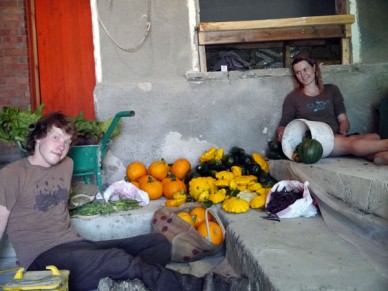
Antony Barrett and his partner Steph run Frog Shadow Farm – a self-sufficiency project in Bulgaria. We were lucky enough to be able to chat with them about smallholding in Eastern Europe and how it differs from here in the UK
Is this your first foray into self-sufficiency?
This is our first big attempt at being self sufficient. Working towards self-sufficiency covers a huge range of topics so in a small way we’ve been learning things for years. For instance, in England every year we’d make country wines and cider, bake bread and every once in a while eat a couple of my dads chickens. Our first year or so of living ‘the good life’ goes to show that anyone can do it. Plants and animals are simple to look after. Of course there will be problems and the odd mistake but most things are much simpler to fix than what people would have you believe. It’s amazing what you can do when you just have a go!
What previous experience did you have before deciding on this lifestyle and why Bulgaria?
Our experience in this field is fairly limited. Neither of us had owned farm animals before or grown vegetables other than in the odd raised bed or flower pot. I spent a lot of time traveling, first in Africa where I saw first hand really how simple it is to grow enough food to live from. In many places I passed through self sufficiency was the only option, I once asked a guy in Malawi what he does for a living, he told me “I dig”. This simple statement inspired me. He wanted more from life of course but from an outsider’s point of view, my point of view, he had everything he needs. Food, shelter and a loving family. During the year and a half I spent cycling through Africa I came to understand that life IS simple. If you have food in your belly, a smile on your face and a place to sleep then you’re all good. By the end of that trip I had formed the idea that I wanted a place of my own where I could live closer to nature. I then spent a year volunteering in New Zealand on organic farms through an organization called WWOOF (willing workers on organic farms) – which is brilliant in New Zealand but the Bulgarian branch isn’t up to much. During that trip I learnt a lot about making wine, keeping goats, sheep, pruning fruit trees and a whole lot more.
Bulgaria just kind of came along, we were looking for cheap land prices and Bulgaria came up on a Google search. We went on a holiday and within a year and a half had bought and paid for our place out here.
How easy is it to find and buy land in Bulgaria? Is it much cheaper than the UK? Are the laws significantly different and how did you make sure you didn’t fall fowl of any local legal process?
Finding land and properties out here is incredibly simple as a huge amount of the houses are empty. Lots of the young folk have left the small villages and loads more have moved West in search of their fortune. There’s a few ways you could buy land out here. On-line estate agents are one option, ebay is another but I would recommend just coming out here, looking around the country a bit, finding a village or town you like and asking what’s for sale. Estate agents in my experience will rip you off, we used one and found out that the previous owner received less than half the amount we paid (every ex-pat you speak to has a similar experience). Land is pretty cheap out here roughly £1000 to £2000 an acre depending on whether it’s in a village or not. There are a couple of difficulties out here with buying land. Even though they are a full member of the EU foreign nationals can’t personally own land, you have to register a company then the company buys the land. It’s not too much hassle, once a year you have to pay a solicitor to do your tax return which is very cheap. It would be a good idea to get a lawyer to help you with the documents, in our local town there is a translator that knows all the ins and out of property law who is very reasonable. Officially the laws are much the same as in the UK but from my personal experience they seem much more relaxed, you can do pretty much whatever you like on your own land and no one will bat an eye lid. The whole way of life is slower and more relaxed even when the police pull you over they seem more happy to practice their English than to tell you off.
How much land do you have? How is it arranged and what proportions are allotted to vegetables, livestock, building etc
Our whole place is just over one and a half acres. The house, barns, animal area and grape vines take up half an acre. Our vegetable patch is about half an acre where we grow just about everything we eat. Next year I’m going to use a smaller area but grow more intensively. We produce organic grain on 3/4 of an acre for animal feed. We get a local farmer to plant and harvest that for us. The first year we tried to scythe and thresh it by hand but after a couple of days in the blistering heat we decided it’d be much easier to pay a few Levs for a local to come by with his combine. We grow as many extra vegetables as we can for the animals; maze, sunflowers, potatoes and a patch of Jerusalem artichokes for the pigs to dig up in the autumn.
How self-sufficient are you? Can you feed yourself all year round and how do you manage that?
We manage to produce enough food for us to eat all year round. During the summer we eat lots of fresh salads, vegetables, loads of eggs and if we’re lucky a goat or two. When autumn comes we get into preserving mode, some things are jammed, some are dried, others bottled, a fair old whack goes in the deep freeze. A pig or two gets processed into sausages, chops and bottled meat. Potatoes store well in a cool room, pumpkins also last well into spring and certain cultivars will last much longer, leeks keep well into winter too. Of course we’re still learning how to grow and preserve our own food, this is the beginning of our second full year. Saying that, over the first winter we hardly bought any food. Things like sugar, coffee, tea, white flour, and rice are bought in as they’re pretty tricky to produce yourself. All the meat and vegetables we eat are from our own place, most meals are cooked in lard rendered from our pigs in a big pan over a fire, each year we produce a few hundred litres of wine and probably an unhealthy amount of rakia (the Bulgarian name for home brewed brandy).
We believe in the law of return, what we take from the soil we put back. We use composting toilets which returns the nutrients we’ve eaten back to the soil, all the animal manure goes on the compost heap, along with any other scraps from the garden. We have people come to stay and help us on the farm, no one can believe how the toilets don’t smell. The system we use is incredibly simple, it’s a collection system, basically a bucket under a toilet seat, you go to the loo like normal then cover your deposit with sawdust, when the bucket’s full you empty it onto your compost heap and cover it with some straw. There’s a great book on the subject called the The Humanure Handbook: A Guide to Composting Human Manure by Joseph Jenkins. The book is a surprisingly good read and very informative, you never know it might have you crapping in a bucket one day!
Do you trade with other locals for anything you can’t produce yourself?
We often swap seeds with locals and trade our time in exchange for experience. My neighbour keeps a huge amount of bees (in the region of 300 hives) so when the hives are full to the brim with honey I go down to help with the harvest. I get hands on experience and knowledge from an experienced bee keeper plus a few jars of honey and whenever we need help they’re always willing to lend a hand. We acquired our first bee hive in a barter, I had piglets for sale, so rather than paying all cash took half cash half bees! In another barter we wanted an animal to roast whole in the outdoor oven but our goats hadn’t reached a good enough weight so we went over to a farmer at the end of the village, had a chat and came home with a lamb to be roasted the next day. We’ll give him one of our goats in return when they’re big enough. People out here get by and manage to live with very little money, they can do this by helping each other out.
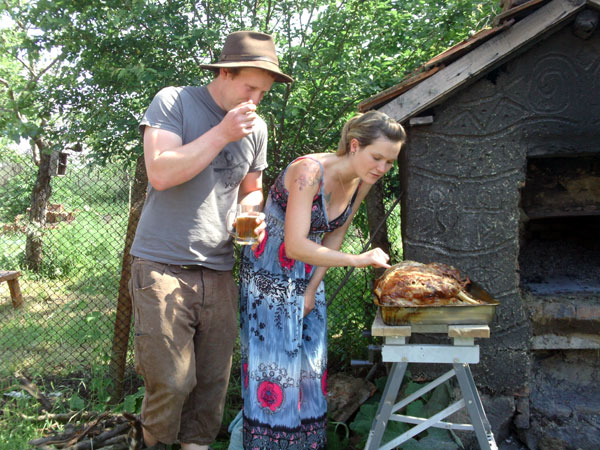
Whole roast lamb from the outdoor oven
Are the seasons and weather similar to the UK?
The seasons are fairly similar, in Bulgaria we get a spring, summer, autumn and winter but they all more extreme. Winters are colder, summers are hotter. We get a long summer out here which is great for producing crops but it can get pretty dry so you have to irrigate.
What livestock do you keep and how do you use them?
We keep pigs, goats, chickens, rabbits and bees. The pigs are great animals, they are the real work horses of our property. We put them out on the land to do the digging for us, they tidy up any crop residue after we harvest and at the same time spread their marvellous fertiliser. The goats are amazingly useful and economic creatures, they provide us with lots of milk, cheese and meat. The nanny goats go out with the village shepherd to graze all day long and come home at the end of every day with udders bulging with milk. Most villages in rural Bulgaria have a shepherd, ours costs 4 Lev (about £1.70) per animal per month. I wouldn’t be without chickens to produce eggs and meat they also tidy up any spilt grain. Rabbits are not for me. We kept them for a year and a half with mixed success and failure. I’m not a great fan of their meat and they take a fair amount of work to keep them happy so I’m going to stick the whole lot in the freezer.
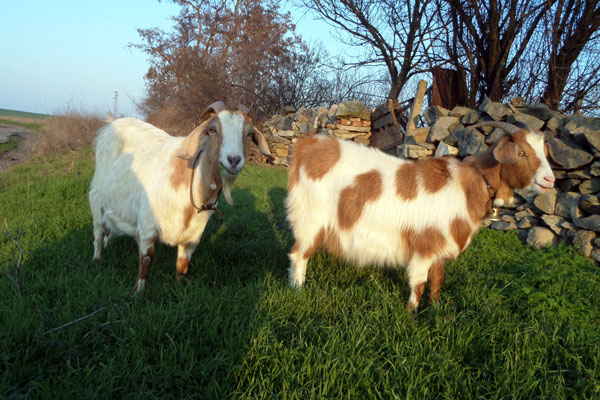
The Frog Shadow milking goats Primmy and Little-B
Most households in our village have animals, nearly everyone has chickens, most have a few goats or sheep, a lot have a pig or two, lots of people use donkeys or horses and carts for transport. The livestock laws are much the same as anywhere in the EU but people are relaxed about them out here, you can do what you want and no one minds.
What are the biggest benefits of smallholding in Bulgaria and the main disadvantages if any?
There are a lot of advantages of having a smallholding in Bulgaria the main one is that people are still living in traditional ways, every spring you see people out in their fields with horse and plough, early summer every one is out cutting hay and storing it for winter use, people still preserve food using traditional methods, people still know about wild medicinal herbs. Another advantage is you can buy yourself a piece of land and a house for less than the price of a car in the UK. I don’t like the idea of being tied to a mortgage for the rest of my life, I find it hard to believe that a tiny patch of land and a few bricks can be worth 70 odd years work. As it is we own enough land to feed ourselves and have a house to keep us warm.

Learning how to make jarred meat from the locals
Alas there are disadvantages to living out here. The language is very different to English so takes a lot of effort to learn. I can get by speaking to the locals but I’d love to be able to speak fluently. The main disadvantage is that earning money out here is difficult. In the UK if you need some money you can pick up a job for a few months but out here there are very few jobs to be had. Another possible disadvantage is that there are very few young people, the average age of the people in my village is about 60 so within 10 or 20 years I think a lot of the traditional skills and crafts will have died away. It’d be great if people moved back into the small villages to work the land in a sustainable fashion, you can have a great life out here, yes it’s hard work and you’ll never be rich but who cares you’re really living!
Any advice for those who may be thinking of a similar venture?
I would advise anyone who is thinking of moving out here on a similar venture to spend a month or two travelling around the country to get an idea about where they think would suit them best. I would also avoid estate agents like the plague. True, it may seem harder to find the perfect place without the help of a UK agent but if you come out here and get talking to a few locals they will tell you about all the houses for sale in the village of your choice. I would also recommend thinking hard about an income source, the perfect situation would be to have a small income from outside Bulgaria coming in. Living out here is cheap but you still need money for things like fuel, taxes, tools and maybe the odd emergency. All that aside, life out here is simple, peaceful and much more satisfying. It’s not to everyone’s taste but if you think you might like it you could come and volunteer through one of the many web sites; Helpx, Work Away and Couch Surfing are all sites I’ve used with success.
9 Comments
Leave a reply
Features categories
Most recent Features articles
- Starting with self-sufficiency 05th December, 2017 , sel sufficiency
- Smallholding in Ireland 15th September, 2015
- Applying vintage tools in the 21st century 12th July, 2015
- Product review: Norfolk Chicken Barn ‘Ecoflex’ poultry house 07th August, 2014
- Eastern Promise: Smallholding and self-sufficiency in Bulgaria 07th July, 2014
- Ragwort: menace or maligned? 22nd May, 2014



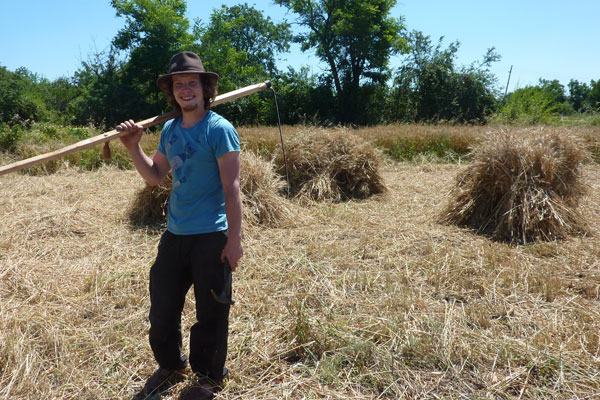

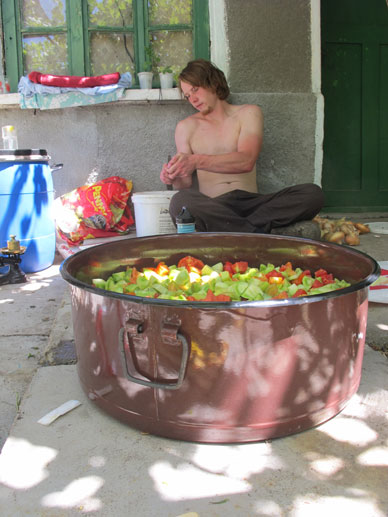





Wonderful and inspirational story, best of luck to this young couple and for anyone else who decides to live their dream. Back to the old ways!
Thanks for your words – you have just tipped the balance. My question would be – what is the best time to move out considering we will be setting up as near as damn it self sufficienct?
Thanks
Great personal account of village life in Bulgaria.Be warned… the life isn’t for everyone! Don’t expect lovely suburban gardens with neat hedges. Life in villages is really different. I have a little house in BG near Varna, one of the bigger cities in Bulgaria.But although we are only 15km from the city, this is village life. Most people depend on the land for their food and gardens are for growing vegetables. Yes… there are some big villas with flowers and even swimming pools, but these are a real minority!
Today I collected about 7 kilos of tomatoes ranging from cherry toms to the big beef toms.. lunch was beautiful with salads, local cheese and olive oil.
OK… the road outside is rough, the garden could be tidier. But we had big, sweet figs for desert. Soon the grapes will be ready for picking.
As I said, it won’t suit some. But give it atry… you may be hooked!
Hi Phil just your comment,as me and the wife also have a property 15km from Varna in a village called Voditsa we hope to move there full time in about 2 years ??email me for a chat if possible
We moved to BG last year, though have owned a property for a while.
We are on a fast learning curve as we were both employed in retail and now find ourselves learning gardening and all sorts of building skills, on a daily basis.
I would have a few questions if you are willing to answer via email?
if not, good luck in your venture
Ian
Yep . That just tipped it for me . Getting my wallet and passport now . Knew i should of done it yrs ago .well done guys , live the dream .
Been living in Bulgaria for 10 years. Semi self sufficient. Turkish/ Bulgarian wife and step family. Kept pigs previously and worked for 5 years old. A farm in Lancashire. Big gardens. About to butcher a beef calf. Have ewes in lanb. When calf in freezer want some piglets to grow on. At least 2, maybe 4. Contacts. Also be good to stay in touch
Been doing similar for 10 years near Targovishte. Only foreigner in village, but despite hair and beard, now part of village life. The Anglichan. Have a beef calf, soon destined for freezed, ducks, just one he , ( the fox got the others so waiting for spring to replace), 5 sheep in lamb. The tup got really aggressive, did his job, and now eating part of him. There’ll be a tup lamb to replace him. A goat in freezer. Veg from gardens. Compote, pickles etc. Make my own rakia. Calf to slaughter in # weeks. Next year at least 2 piglets. Would like Glou ester old spots or, , as well Tamworths.
Grew up in Korea (that time it was rural all over)and I did swear I would never farm when I (no machinerieas all manual that time there) retire.
But by looking at your article, I may change my mind if I can use all the possible machineries which seemed available in Bulgaria..
Will be there when my Bulgarian American friend comes back for vacation from the ship he is working.